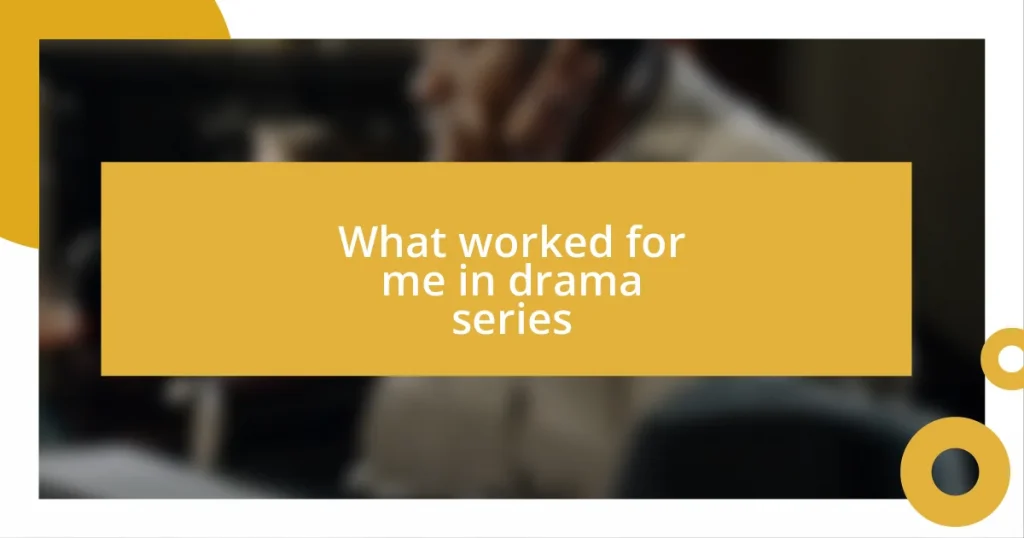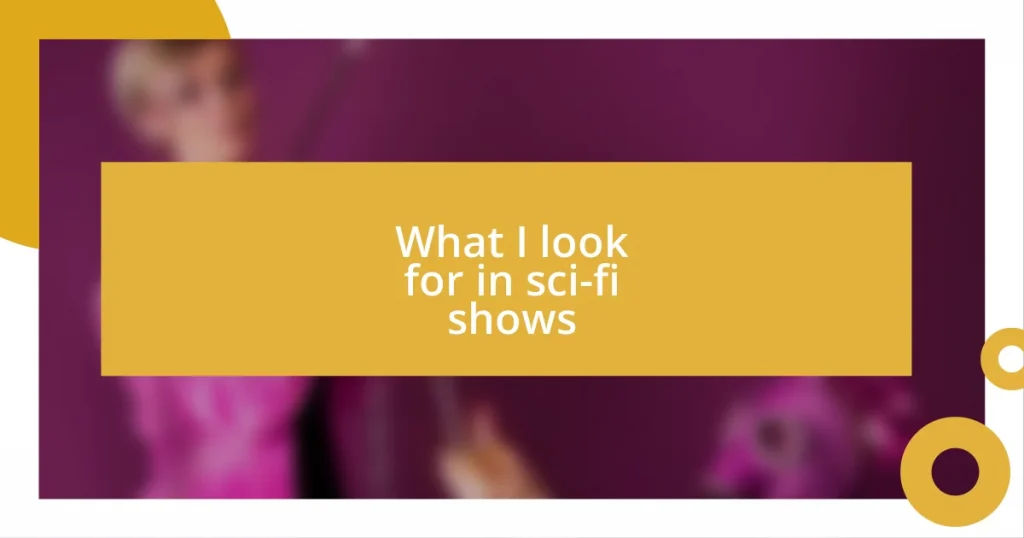Key takeaways:
- Embracing change can be empowering and lead to personal growth, transforming fear into opportunity.
- Developing a growth mindset and resilience involves viewing challenges positively, setting realistic goals, and reflecting on progress.
- Building a supportive network and nurturing connections with others can provide essential emotional support during times of change.
Understanding the need for change
Change is often viewed as intimidating, but I remember a time when a significant shift in my career taught me just how essential it is. When my company underwent a major restructuring, it felt overwhelming initially. However, that experience opened my eyes to the opportunities that change can bring, igniting a newfound passion in my work.
Why is it that we resist change even when it’s clear it can lead to better outcomes? I’ve often noticed that fear of the unknown can paralyze us. Yet, I’ve found that leaning into that discomfort and recognizing it as part of growth can be incredibly empowering. Embracing change, even when it’s challenging, has taught me that adaptability is not just a skill; it’s a mindset.
Understanding the need for change goes beyond just accepting it. It’s about recognizing the signals around us—whether in our personal lives or workplaces. Reflecting on moments when I resisted change made me realize how often I missed opportunities for growth. Every time I embraced a shift, I discovered new strengths and perspectives that I never knew I had. Wouldn’t that realization encourage you to see change in a more positive light?
Embracing a growth mindset
Embracing a growth mindset has been transformative for me. I remember a time when I faced a project that seemed insurmountable. Instead of succumbing to doubt, I challenged myself to view it as an opportunity to learn. I uncovered skills I didn’t know I possessed, and this shift in perspective turned stress into excitement.
When faced with obstacles, it’s easy to feel defeated. However, I’ve discovered that looking at challenges as stepping stones is powerful. For instance, after receiving critical feedback on a presentation, I initially felt discouraged. But I decided to reflect on the constructive aspects, and my next presentation not only improved but became the best I’ve ever delivered. This taught me that each setback is a chance to grow.
Cultivating a growth mindset requires consistent effort. I’ve made it a habit to seek out learning opportunities, whether through online courses or professional workshops. The more I invest in my personal development, the more I realize that change isn’t something to fear; it’s a pathway to new adventures. Isn’t it liberating to think that every change offers us a new chance to expand our horizons?
| Fixed Mindset | Growth Mindset |
|---|---|
| Views challenges as threats | Sees challenges as opportunities |
| Avoids risks | Embraces risks and learning |
Developing resilience to change
Developing resilience to change has been a key factor in my ability to thrive amid uncertainty. I can still recall a personal experience when I lost a job I cherished due to unforeseen circumstances. Initially, it felt like the ground beneath me had disappeared. However, I eventually recognized this as a chance to discover new paths. By breaking down the process of finding a new role into manageable steps, I built my resilience, taking each small success as a sign of progress.
To cultivate resilience, here are a few strategies that have helped me:
- Practice self-compassion: Acknowledge that it’s okay to feel overwhelmed, and be gentle with yourself during tough times.
- Stay connected: Surround yourself with supportive people who can offer encouragement and perspective.
- Reflect on past experiences: Identify challenges you’ve overcome in the past to remind yourself of your strength and adaptability.
- Embrace flexibility: When plans change, instead of resisting, try to find creative solutions or alternatives.
- Set realistic goals: Focus on small, achievable objectives that can build confidence and promote a sense of accomplishment.
These practices not only helped me adapt but also taught me that resilience is not just about bouncing back; it’s about learning and growing through the journey.
Practical strategies for adaptation
One strategy I’ve found invaluable is creating a routine amidst chaos. When I faced a sudden shift in my work environment, I took time to establish a daily structure. This simple act provided me with a sense of control and certainty. Isn’t it interesting how something as mundane as a daily schedule can anchor us when everything else feels unpredictable?
Another effective approach involves actively seeking feedback from those around me. After I completed a significant project that didn’t meet my expectations, I reached out to colleagues for their perspectives. Honestly, their insights opened my eyes to several aspects I hadn’t considered. This process not only highlighted my blind spots but also fostered a collaborative atmosphere where continual improvement became the norm.
I also believe in the power of visualization—seeing where I want to go amidst change. I recall picturing my ideal outcome after a major career pivot. By clearly defining my goals and anticipating the steps I needed to take, I felt more prepared to embrace the unknown. Visualizing success helped transform my anxieties into anticipation. Doesn’t it feel wonderful to take charge of your own narrative?
Building a supportive network
Building a supportive network has been an essential aspect of my journey through change. There was a time when I felt isolated after relocating for work, far from friends and family. I realized that reaching out and connecting with new colleagues not only enriched my professional life but also provided a vital emotional support system. Have you ever noticed how just talking about challenges can lighten the load?
I often reflect on the importance of sharing experiences with those who truly understand my journey. I’ve joined local meet-ups and professional groups, and those interactions sparked friendships that have become lifelines during tough times. Being able to share my feelings openly has made such a difference—someone simply recognizing my struggles can transform my perspective entirely. Isn’t it amazing how a little support can provide the boost we need to keep going?
Additionally, I’ve learned that nurturing these connections requires effort, like checking in on friends or offering help when they need it. Just last month, a friend reached out after a setback, and being there for her reminded me of the warmth and strength that comes from genuine relationships. Building a supportive network isn’t just about receiving; it’s about giving back as well. How do you cultivate your supportive relationships in times of change?
Setting realistic goals for change
Setting realistic goals during times of change is a game-changer for me. When I was transitioning into a new role, I made a conscious decision to break my objectives into smaller, manageable steps. For instance, instead of aiming to master everything at once, I focused on learning just one new skill per week. This strategy not only made my goals more achievable but also allowed me to celebrate small victories along the way, giving me the motivation to tackle the next challenge. Have you experienced that delightful rush of accomplishment from achieving a modest goal?
I also find that prioritizing my goals by their significance helps streamline my efforts. Once, while navigating a period of significant life upheaval, I took a step back and asked myself what truly mattered. This reflection led me to prioritize personal well-being and professional development over less important tasks. By aligning my goals with my core values, I felt a renewed sense of direction and purpose. Isn’t it remarkable how clarity in prioritization can ignite a passion for growth?
Moreover, I believe in the importance of being flexible with my goals. There was a moment when I realized that one of my ambitious targets was no longer relevant to my evolving circumstances. Instead of feeling defeated, I pivoted my focus to something more in tune with my situation. This experience taught me that adaptability is just as critical as goal-setting itself. Can you recall a time when adjusting your goals turned out to be the best decision you made?
Reflecting on personal progress
Reflecting on my personal progress during periods of change has become a powerful practice for me. I’ve often found a quiet moment to look back on my journey, and it’s enlightening to see how far I’ve come. For instance, when I first started adapting to a new role, I felt overwhelmed; now, I can confidently say I’m thriving in that environment. Have you ever taken the time to appreciate your growth? It can be a stunning realization.
There’s something deeply rewarding about acknowledging my milestones, no matter how small they might seem. A few months back, I faced a challenging project that pushed me out of my comfort zone. When I completed it, I didn’t just celebrate the end result; I reflected on every late night and brainstorming session that led to my success. The process of looking back illuminated not just my achievements, but also the perseverance I didn’t know I had. Isn’t it surprising how recognizing our journey can spark a new level of self-awareness?
Occasionally, I encounter moments where past struggles resurface, and I find it helpful to revisit those memories. They remind me of the resilience I’ve developed along the way. Last week, I stumbled upon an old journal where I detailed my fears during a major life transition—I barely recognized that person. This insight brings a sense of gratitude and encourages me to embrace current challenges. Have you ever reflected on your earlier self and felt a mix of compassion and admiration for how far you’ve traveled?












